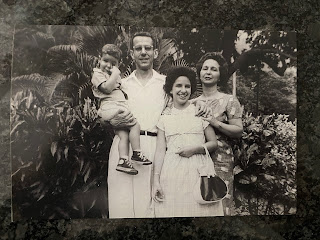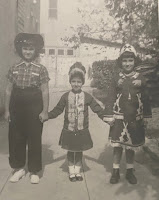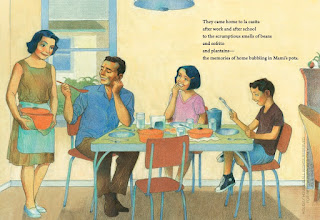Here’s a sneak preview of The Little House of Hope (La Casita de Esperanza) by Terry Catasús Jennings, illustrated by Raul Colón, scheduled for release by Holiday House on June 14, 2022, and interview with the author.
Julie’s Review:
This beautiful picture book for ages 4-8 tells the story of a family who immigrates from Cuba to the U.S., where they rent a modest house.
It was small.
It smelled like old, wet socks.
It had rickety, tattered furniture
from a church basement…
But the family was together.
They were safe.
They were happy in la casita.
To make ends meet, the parents each work two jobs, and Esperanza and her brother Manolo work hard in school. On weekends, they fix up the house, scrubbing, painting, and making repairs. La casita becomes home, complete with the good smells of Mami’s cooking and decorated with the children’s art. Esperanza makes a collage of her name in Spanish and English. Esperanza=Hope, which is what they found in la casita.
As they learn of other families who need somewhere to live, they open their doors. By sharing their home, they help other newcomers achieve their dreams
Little House of Hope is a heartwarming story of hard-working immigrants who come to the U.S. full of hope and promise, and share what they have to help others. Terry Catasús Jennings’s text is spare and lyrical, while Raul Colón’s watercolor illustrations bring the family to life in vivid, expressive detail. This is a book that is at once charming and important.
Interview with Author Terry Catasús Jennings:
Terry Catasús Jennings

Julie: Welcome back to the Grog Blog, Terry! Today, we'll talk about The Little House of Hope. Like the family in the book, your family emigrated from Cuba in 1961 when you were twelve years old. How close is the book to your own experience?
 |
| Terry, center, in Cuba with extended family, 1959 |
When our family was finally able to rent a house of our own, our furniture came from the church basement, and I decorated the walls with collages I made on colorful poster board. One house we rented did have a peculiar smell, like old wet socks. When we lived with my aunt and uncle, the good smells of my aunt’s cooking filled the house. BUT after we moved out and my mom cooked, it mostly smelled of burnt rice. Mami had never cooked before in her life! She lived with her grandmother until she got married, and then she had a maid. So I stretched things a bit there.
 |
| Terry in Cuba with her Mami and Papi and brother Tony |
Julie: In your Author’s Note, you say this book was born out of anger. Tell us about that.
Terry: A realtor I knew told me he never rents to Hispanics because they live four families to a house and trash the property. It made me angry. He knew I was Cuban and had known me for years. Then I had a lightbulb moment: I was one of those people! We lived three families to a home, and we left it better than when we moved in. That was the kernel of Little House of Hope. I wrote the book very quickly. Neal Porter expressed interest within hours of my agent’s e-mail, and we had an offer two weeks later.
Julie: What do you love about this book?
 |
| Raúl Colón, Illustrator |
Terry: How can you not love Raúl Colón’s illustrations? They are so evocative. When Neal Porter, our editor, told me Raúl was to illustrate The Little House of Hope, I was elated. I was already captivated with his work in Good-by Havana, Hello, New York. Raúl is from Puerto Rico and his wife is Cuban, like me. Raúl got Cubans right. One of the spreads in Little House shows the father after he has a good job. That man looks just like my papi. It made me cry.
I also love that I got to do the translation for La Casita de Esperanza. Neal allowed me to keep my Cubanisms, words like guagua, which we use for bus, when other Latin American countries use autobus. I had a fairy godmother, Eida DelRisco, who watched over me to make sure my grammar and usage were correct. We found that some phrases were more lyrical in Spanish, so we changed the English to match. When we got a review that praised the lyricism of my Spanish, I knew we’d nailed it. I couldn’t be happier about the way the whole project turned out.
Julie: Many of your books are based on your life experiences. As a writer, how do you mine your past for story ideas?
 |
| With friends, in costumes |
Terry: As writers, our experiences always inform our stories. In the Definitely Dominguita series, I was the girl who was just as happy reading as doing anything else. I didn't need friends because I had my books. When I look at pictures from when I was young, so many show me in costumes because we loved to pretend. That became the basis for Dominguita.
The story of The Little House of Hope is largely true. I use events in my life in all my stories. I have experienced discrimination—stupid things, large and small, that made me feel like a second-class citizen. Those experiences hurt. For the longest time I wouldn't tell anyone I was Cuban. My English was good, my last name was Jennings. Nobody needed to know. I kept that up until I was 46 years old!
Having experienced discrimination, I want my books to show that people like me are not different. When I was younger, I used to tell my friends, "You know, there were big buildings, museums, and world-renowned restaurants in Cuba, too," because many kids thought I’d lived in a hut made of sticks with a thatched roof. When people view you through a lens that distorts the truth, it’s your responsibility to bring that truth out in your books.
(1).jpg) | ||
| U.S. Citizenship Day (Terry in green) |
From anger, I hope this
book brings understanding. It is dedicated with unwavering gratitude to the
country that took us in, and to all immigrants who come to the United States in
search of hope.
Julie: Thank you, Terry, for your insights. Best wishes for success with Little House of Hope. It’s a lovely book.



Great interview! And it sounds like a beautiful book.
ReplyDeleteIsn't Julie the best? I think it's a beautiful book. I am very proud of it. Sorry it took me so long to respond. I had my first author's visit so this old lady had to memorize everything. But I am very excited that I am able to show immigrants in a positive way and show young readers that in the end immigrants do contribute to our communities. Thanks for commenting, Amy.
DeleteTerrific interview. I'm looking forward to reading this book.
ReplyDeleteCharlotte, I hope you like it. It is, like they say, the book of my heart. Who could want more than to show that we are all human and all deserve respect and dignity? I am so happy this book was published. Thanks for your kind comment. And yes, Julie is the best interviewer.
DeleteGreat interview! Congrats on this book born out of anger :) I hope you give the realtor a copy.
ReplyDeleteOh Tina, you know what? He doesn't even know he did something remotely hurtful. It is so natural for him to consider immigrants as less than. That's what I hope this book brings out. That we are all human. I honestly have thought of sending him the book. I don't think he'd see himself, though. Thanks for the comment.
DeleteTerry:
ReplyDeleteNo me gusta que hayas experimentado discriminación. Me complace que haya aceptado su herencia y haya escrito este hermoso libro.
Suzy Leopold
Gracias Suzy. Este libro es tan importante. Y tambien es tan importante que hablemos de estas cosas en vez de quedarnos calladas. Gracias por escribir. Terry.
DeleteThanks for a wonderful interview. The book sounds great. I will difinitely check it out.
ReplyDeleteRosi, Thanks so much for commenting. Julie is amazing. I hope you do get to check out the book and that you love it when you get it. All the best, Terry
DeleteThanks, Everybody. Enjoy this wonderful book. Coming next week!
ReplyDeleteJulie, Thank you, thank you, thank you. Lots of hugs, Terry
Delete